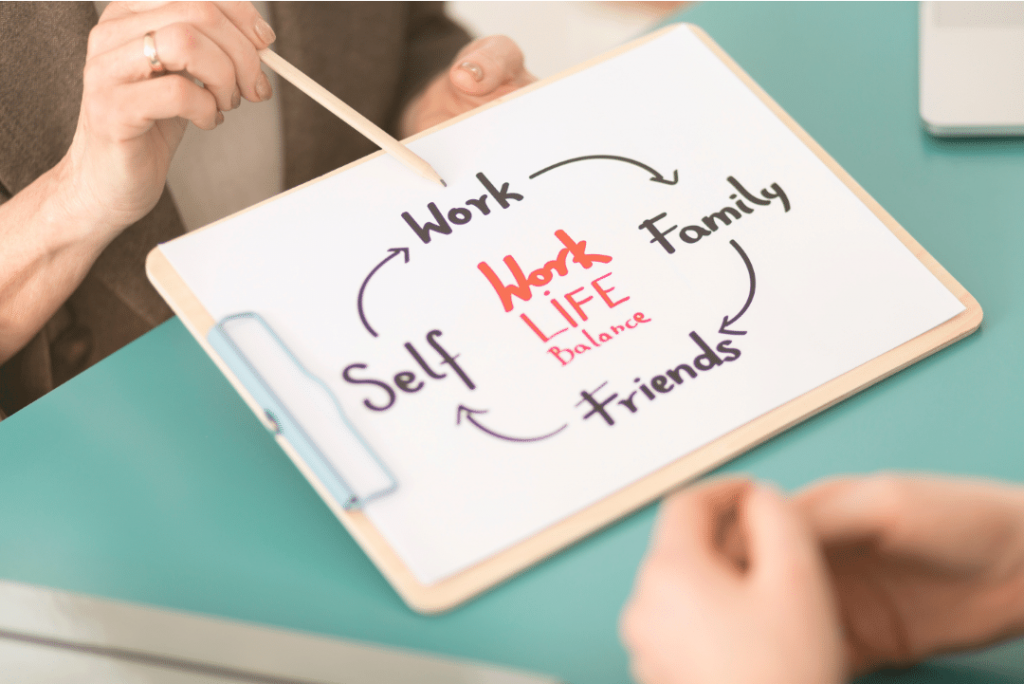Career Trends: April 23, 2022
Curated by the Knowledge Team of ICS Career GPS

Content Credit:
- Excerpts from article by Margarita Tartakovsky, published on healthline.com. Original article link.
Thanks to remote work, super-smart tech, and more flexible schedules, a clear divide between your professional and personal lives may feel next to impossible, these days. But a healthy work-life balance doesn’t involve a perfect, 50/50 split.
Sally Anne Carroll, a life and career reinvention coach and author, notes that having a good work-life balance means showing up for the various parts of your life in the way you want.
With so much fluidity, how do you know when things are amiss?
According to Rebecca Phillips, a licensed professional counselor and owner of Mend Modern Therapy, these are the three key signs:
- you’re experiencing difficulties in your relationships
- you’ve become negative, cynical, irritable, or resentful
- you’re emotionally, physically, or mentally exhausted
Here are 12 tips to help you carve out a meaningful, fulfilling work-life balance, on your own terms:
1. Know it’s super personal
- Before you start making changes, remember that a good work-life balance is “highly individual,” says Carroll.
- “What feels balanced to a young professional will be different than what feels balanced to a high-level executive leading a large company or to a working parent,” she says.
- Focus on your own roles, responsibilities, and goals.
2. Identify your values
- Work-life balance is about being in integrity with your values and the responsibilities you choose to take on.
- So consider reflecting on what’s important, essential, and non-negotiable to you.
3. Narrow your focus
- After identifying your values and ideal life, consider how they translate into your everyday routine.
- Maybe for you, balance involves: working out most mornings, or picking your kids up from school, taking the weekend off, having no-tech evenings etc.
- Once you have narrowed down those essentials, start to explore how to live out your values.
4. Cut where you can
- Think about how you currently spend your time in your various roles and track it to better understand where and how time is spent.
- Then ask yourself: What tasks can I delegate to someone else? What tasks can I skip altogether?
5. Request changes at work
- Once you’ve outlined your daily priorities, reflect on making any changes at work to help attain your ideal balance.
- Perhaps you can start work an hour later a few days a week to take your child to school, work from home, take a longer lunch once a week to drive your mom to her doctor’s appointment, etc.
6. Honour your energy
- Building a fulfilling life requires energy.
- You can honour your energy in several ways, pay attention to when you feel most alert and ready to tackle your responsibilities. Prioritise the most important tasks for then.
- Identify habits, activities, and people that drain your energy.
7. Create tangible boundaries
- No matter your working style, you may benefit from creating stricter boundaries around your job.
- Plus, your mind and body can genuinely relax and recharge.
- Naama Zusman, a certified health & career coach shares: block work email and apps during non-working hours, put your laptop away at the end of the workday, have a separate work phone, and create different emails for work and personal communication.
8. End your work day
- If you don’t set a distinct end to your workday, you might feel stuck in work mode even when you stop working for the day.
- To minimise stress, Zusman recommends having something that represents the end of the workday and the transition to the next part of your day.
- It can be brief or elaborate, like: changing into comfortable clothes, lighting a candle, taking a short walk, making a cup of tea, cuddling with a pet, checking in with your family.
9. Put the good stuff on your schedule
- Along with your work meetings and tasks, block off time for anything that supports your emotional, mental, and physical well-being.
- For example, you might put these activities in your planner: lunch with a friend, morning yoga, browsing the library, meditation breaks, a trip to the beach.
10. Actually use your days off
- Do you take advantage of your vacation days? Not taking time off can quickly lead to burnout and make you feel as if all you ever do is work.
- When you get sick, take the day off completely.
11. Work in focused bursts
- Your work-life balance can take a hit when you have a hard time concentrating and completing tasks.
- To up your productivity, set a timer for for a single task, write down any distracting thoughts to address later, take a short break after each focused spurt.
12. Consider getting professional support
- You might assume you need to reach a point of crisis in order to work with a therapist. But therapists can be an excellent resource when it comes to creating a healthy work-life balance.
- A therapist can help you identify specific things that might make your life fulfilling and outline steps to help get you there.
- Therapists can support you in: setting short and long-term goals, identifying obstacles, creating boundaries, increasing your motivation, and more.
…
Have you checked out yesterday’s blog yet?
Thinking of quitting your job? Try reinventing yourself at work first.
(Disclaimer: The opinions expressed in the article mentioned above are those of the author(s). They do not purport to reflect the opinions or views of ICS Career GPS or its staff.)




One Reply to “Steps to Finding Your Ideal Work-Life Balance”